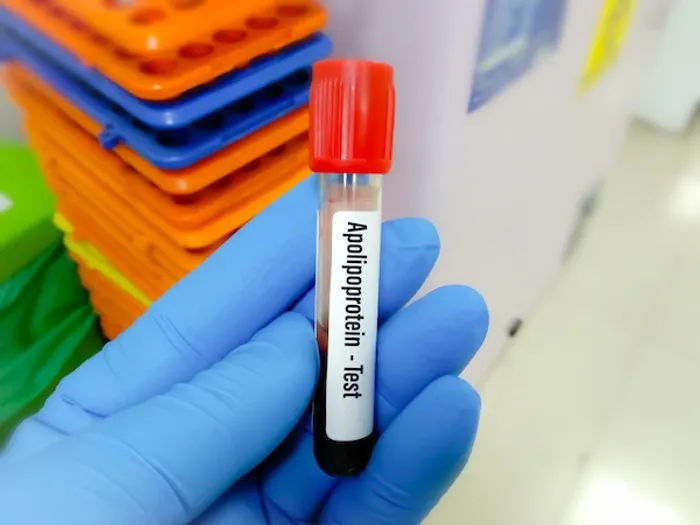Understanding Apolipoprotein Test Results
Understand your apolipoprotein test results with this simple guide, including what the numbers mean and their impact on heart health.


Introduction
Receiving a lab report filled with complex terms like "Apolipoprotein B" or "Apo A-1" can be confusing. If you're holding your apolipoprotein test results and wondering what it all means for your health, you're not alone. This test is a powerful tool that goes beyond the standard cholesterol check, offering a deeper look into your real risk for heart disease. While traditional tests measure the amount of cholesterol in your blood, the apolipoprotein test analyses the proteins that carry that cholesterol, providing a more precise picture. This guide will demystify your test results, explaining what apolipoproteins are, why they matter, and how to interpret your numbers. We'll break down the key markers, discuss what optimal levels look like, and outline clear steps you can take in partnership with your doctor to manage your cardiovascular health effectively.
What is an Apolipoprotein Test?
An apolipoprotein test is a blood test that measures the amount of specific proteins, called apolipoproteins, that bind to lipids (fats) like cholesterol and triglycerides to form lipoproteins. Think of apolipoproteins as the designated drivers for cholesterol; they control where these fats are picked up, transported, and dropped off in your body. This function is crucial because it determines whether cholesterol contributes to artery-clogging plaque or is safely removed from the body. The test primarily focuses on two key players: Apolipoprotein A (Apo A) and Apolipoprotein B (Apo B). Understanding the distinct roles of these two provides the key to interpreting your apolipoprotein test results.
Apolipoprotein A (Apo A): The "Good" Cholesterol Transporter
Apolipoprotein A is the main protein component of HDL (High-Density Lipoprotein), often called the "good" cholesterol. Its primary job is to initiate reverse cholesterol transport, a vital process where excess cholesterol is picked up from the arteries and tissues and transported back to the liver. The liver then processes and excretes this cholesterol. Therefore, higher levels of Apo A are generally associated with a lower risk of cardiovascular disease, as it promotes the cleaning of your arteries.
Apolipoprotein B (Apo B): The "Bad" Cholesterol Marker
Apolipoprotein B is the primary protein found in LDL (Low-Density Lipoprotein), IDL (Intermediate-Density Lipoprotein), and VLDL (Very-Low-Density Lipoprotein), all particles considered harmful in excess. Apolipoprotein B test meaning essentially boils down to this: each of these potentially dangerous particles contains exactly one Apo B molecule. Therefore, measuring Apo B gives a direct count of the total number of atherogenic (artery-clogging) particles in your blood. This is often a more accurate risk indicator than simply measuring the total cholesterol weight inside LDL particles.
Consult a Cardiologist for the best advice
Why Did My Doctor Order This Test?
Your doctor might order this test for several reasons, especially if a standard lipid panel doesn't tell the whole story.
Beyond the Standard Cholesterol Test
A standard cholesterol test can sometimes be misleading. A person can have "normal" LDL cholesterol levels but a high number of small, dense LDL particles (each carrying an Apo B molecule), which is a significant risk factor. The apolipoprotein test vs lipid panel comparison shows that the former offers a more particle-specific risk assessment.
Assessing Heart Disease Risk More Accurately
Research has consistently shown that Apo B levels are a superior predictor of cardiovascular events compared to LDL cholesterol alone. If you have a personal or strong family history of heart disease, early-onset heart problems, or other risk factors like diabetes or metabolic syndrome, your doctor may use this test for a more nuanced risk evaluation.
For Patients with a Family History of Heart Problems
Certain genetic disorders, like familial hypercholesterolemia, cause extremely high levels of Apo B-containing particles. This test can help in diagnosing and monitoring such conditions.
Understanding Your Apolipoprotein Test Results
Interpreting your results should always be done in consultation with your doctor, as they will consider your overall health context. However, here are general guidelines.
Interpreting Apolipoprotein A (Apo A) Levels
What Low Apo A Levels Might Indicate: Low levels of Apo A-1 (a subtype of Apo A) are a risk factor for cardiovascular disease. This suggests your body may be less efficient at removing cholesterol from your arteries. Levels can be lowered by smoking, a poor diet, sedentary lifestyle, and genetic factors.
What High Apo A Levels Might Mean: High levels are generally considered protective and desirable. They are associated with a lower risk of heart disease.
Interpreting Apolipoprotein B (Apo B) Levels
The Significance of High Apo B: This is a major red flag. High apolipoprotein B indicates a high number of artery-damaging particles, significantly increasing your risk for atherosclerosis, heart attack, and stroke. This is a central finding in your test results that requires active management.
What Low Apo B Levels Suggest: Low levels are optimal and indicate a lower number of harmful cholesterol particles, thus translating to a lower cardiovascular risk.
The Apo B/Apo A-1 Ratio: A Powerful Predictor
Many cardiologists believe the ratio of Apo B to Apo A-1 is one of the strongest predictors of heart disease risk. It represents the balance between the harmful and protective forces in your blood. A lower ratio is better. For example, a study published in the Lancet found this ratio to be a more potent risk marker than any single cholesterol measurement.
Get Your Health Assessed
What to Do If Your Results Are Abnormal
An abnormal result is not a diagnosis but a crucial piece of information to guide action.
Lifestyle Modifications: Diet and Exercise
This is always the first line of defense. To lower apolipoprotein B naturally, focus on:
Diet: Reduce saturated and trans fats (found in red meat, fried foods, processed snacks). Increase intake of soluble fibre (oats, beans, apples), omega-3 fatty acids (fatty fish, walnuts), and unsaturated fats (olive oil, avocados).
Exercise: Aim for at least 150 minutes of moderate-intensity aerobic exercise per week.
Weight Management: Losing even a small amount of weight can improve your apolipoprotein profile.
When Medication Might Be Necessary
If lifestyle changes are insufficient, your doctor may prescribe medications. Statins are the most common and are highly effective at reducing Apo B levels. Other options include ezetimibe, PCSK9 inhibitors, or fibrates. If your apolipoprotein test results are consistently abnormal despite lifestyle efforts, consult a doctor online with Apollo24|7 to discuss whether medication is the right next step for you.
Conclusion
Understanding your apolipoprotein test results empowers you to take a proactive role in your heart health. This test moves beyond simple cholesterol numbers to give you and your doctor a clearer, more precise picture of your cardiovascular risk profile. Remember, an abnormal result is a call to action, not a cause for panic. By focusing on sustainable lifestyle changes such as a heart-healthy diet, regular physical activity, and maintaining a healthy weight, you can directly influence these markers for the better. For some, these changes will be enough; for others, effective medications can provide crucial support. If your condition does not improve after trying these methods, consult a doctor for a comprehensive evaluation and a tailored management plan. Your heart health is a lifelong journey, and understanding these results is a powerful first step.
Consult a Cardiologist for the best advice
Consult a Cardiologist for the best advice

Dr. Amit. A. Bharadiya
Cardiologist
12 Years • MBBS, MD General Medicine, DNB Cardiology, FSCAI
Maharashtra
Surabhi Hospital, Maharashtra, Maharashtra
(50+ Patients)

Dr. S B Bhattacharyya
Cardiologist
22 Years • MBBS, MD(General Medicine),DM (Cardiology)
Kolkata
Gariaheart Clinic, Kolkata

Dr Yogendra Singh Rajput
Cardiologist
16 Years • MBBS, MD (General Madicine), DM (Cardiology)
Gurugram
Svasthya Child & Cardiac Care, Gurugram

Dr. Pinaki Nath
Cardiologist
8 Years • MBBS, MD General Medicine, DM Cardiology
Barasat
Diab-Eat-Ease, Barasat

Dr. Mangesh Danej
Cardiologist
8 Years • MBBS, MD (General Medicine), DNB (Cardiology)
Pune
Dr Danej clinic, Pune
(375+ Patients)
Consult a Cardiologist for the best advice

Dr. Amit. A. Bharadiya
Cardiologist
12 Years • MBBS, MD General Medicine, DNB Cardiology, FSCAI
Maharashtra
Surabhi Hospital, Maharashtra, Maharashtra
(50+ Patients)

Dr. S B Bhattacharyya
Cardiologist
22 Years • MBBS, MD(General Medicine),DM (Cardiology)
Kolkata
Gariaheart Clinic, Kolkata

Dr Yogendra Singh Rajput
Cardiologist
16 Years • MBBS, MD (General Madicine), DM (Cardiology)
Gurugram
Svasthya Child & Cardiac Care, Gurugram

Dr. Pinaki Nath
Cardiologist
8 Years • MBBS, MD General Medicine, DM Cardiology
Barasat
Diab-Eat-Ease, Barasat

Dr. Mangesh Danej
Cardiologist
8 Years • MBBS, MD (General Medicine), DNB (Cardiology)
Pune
Dr Danej clinic, Pune
(375+ Patients)
Frequently Asked Questions
What is a normal range for apolipoprotein B?
While ranges can vary slightly by lab, a desirable level for Apo B is generally below 100 mg/dL for average-risk adults and below 80 mg/dL for those with high heart disease risk or diabetes. Your doctor will interpret your result based on your individual health profile.
Can I eat before an apolipoprotein test?
Typically, yes. Fasting is not always required for an apolipoprotein test, unlike a standard lipid panel which often requires 9-12 hours of fasting. However, you must always follow the specific instructions given by your doctor or the testing lab.
How can I lower my apolipoprotein B levels naturally?
To lower apolipoprotein b naturally, focus on a diet rich in soluble fibre (oats, legumes), unsaturated fats (olive oil, nuts), and omega-3s (salmon, flaxseeds). Avoid trans fats and limit saturated fats. Regular aerobic exercise and maintaining a healthy weight are also critically important.
Is the apolipoprotein test better than a standard cholesterol test?
It is not necessarily 'better,' but it is more specific. It provides a direct count of the number of harmful particles, which can be a more accurate risk predictor, especially in cases where standard LDL cholesterol measurements might be misleading.
How often should I get this test?
There is no standard guideline. The frequency is determined by your doctor based on your initial results, overall cardiovascular risk, and whether you are undergoing treatment (like lifestyle changes or medication) to manage your levels. Apollo24|7 offers convenient home collection for tests like this, making follow-up monitoring easier.
